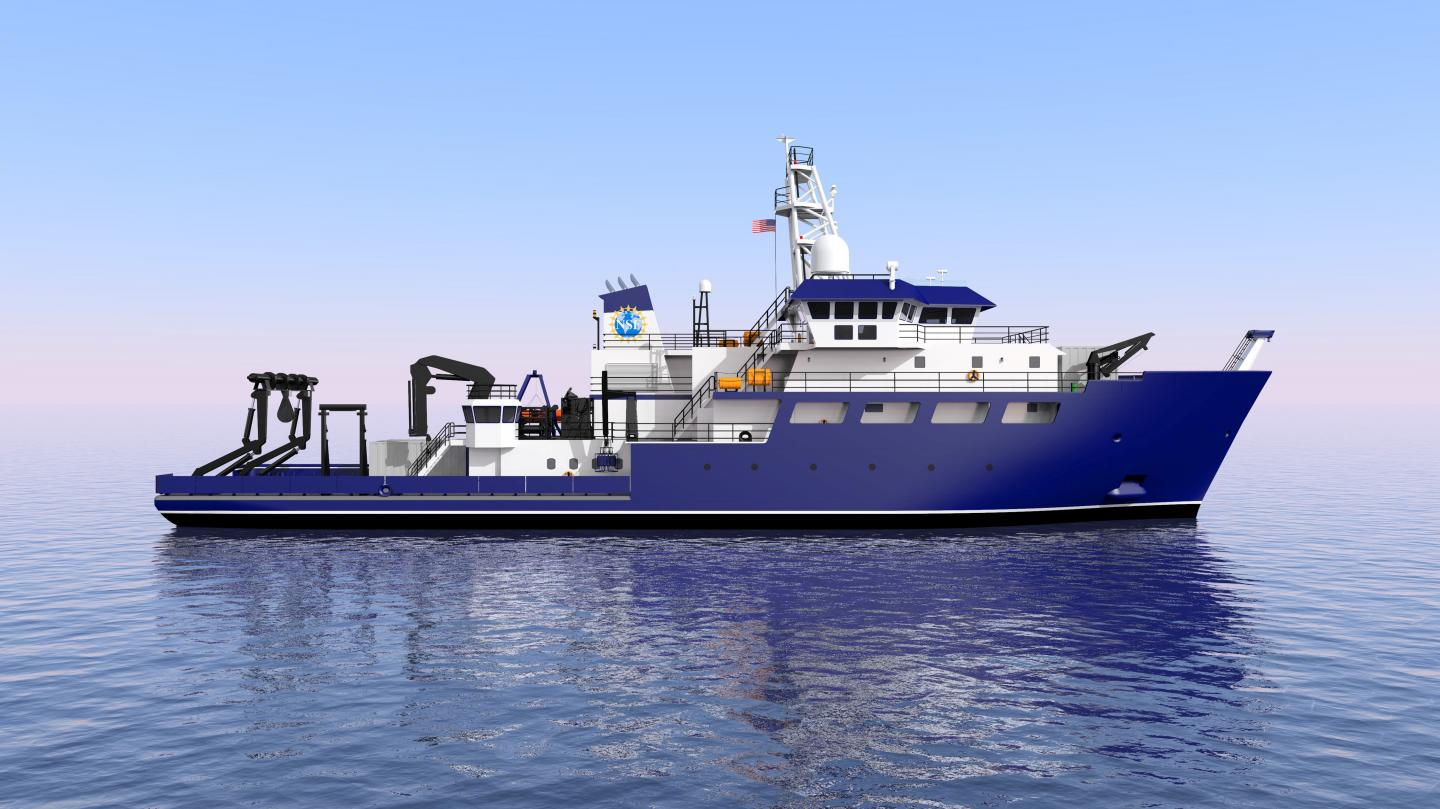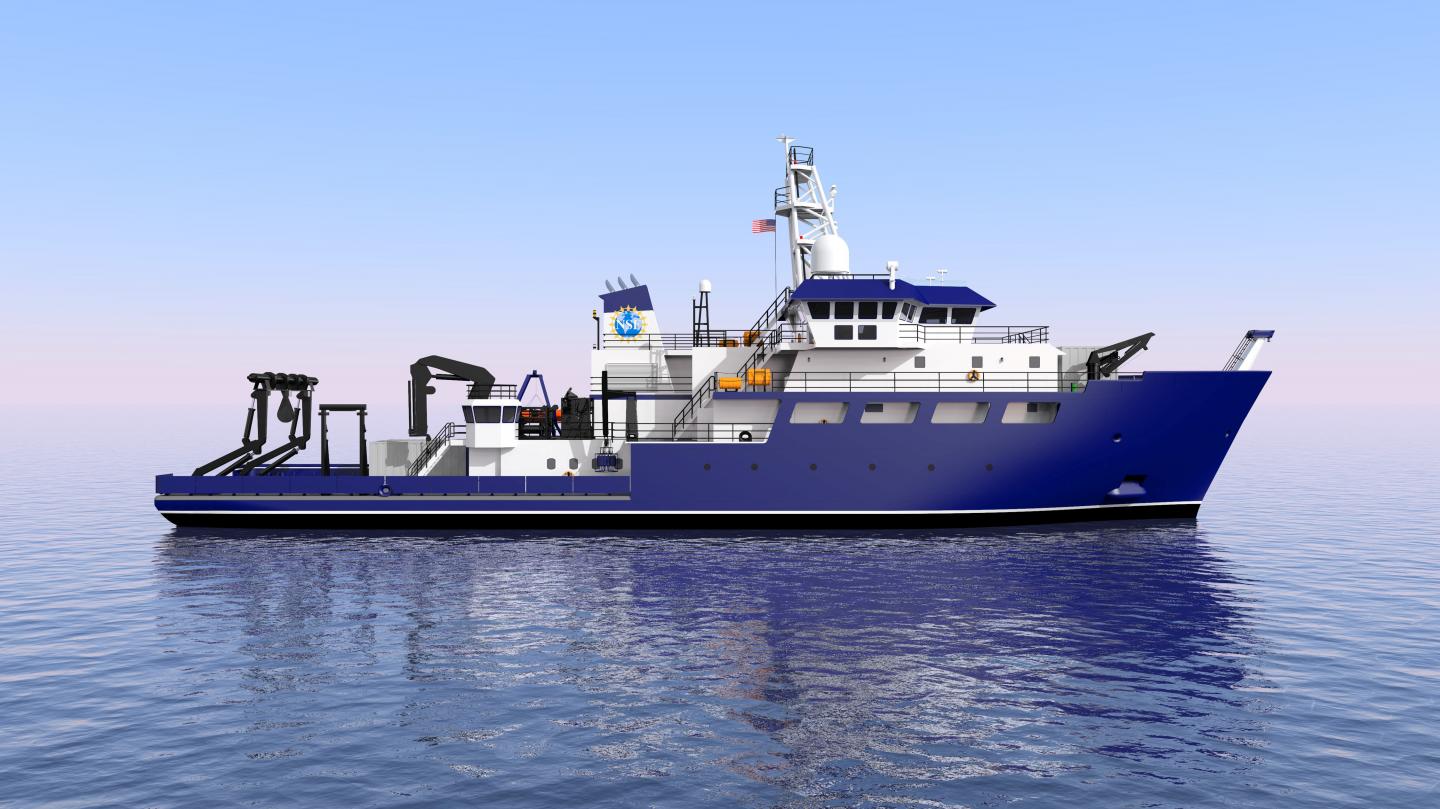
Credit: Glosten Assocates
KINGSTON, R.I. – July 12, 2018 – The National Science Foundation (NSF) has selected the East Coast Oceanographic Consortium, led by the University of Rhode Island's Graduate School of Oceanography, to operate a new oceanographic research ship, one of only three such vessels in the nation.
Owned by NSF and valued at over $100 million, the Regional Class Research Vessel will be constructed in Louisiana, delivered to Rhode Island in 2021 and home-ported at URI's Narragansett Bay Campus.
"This significant investment in the nation's scientific research recognizes URI's half-century of leadership in the field of oceanography and its long-standing and fruitful collaborations with partner institutions," said URI President David M. Dooley. "No doubt the new vessel will help researchers, educators, students and the public gain a richer understanding of our planet and stimulate exploration that will lead to discoveries we can't yet imagine."
"This is tremendous news for the Consortium members, URI, and the state of Rhode Island," said Bruce Corliss, dean of the Graduate School of Oceanography. "This new ship and our consortium will provide cutting edge technology and exciting new opportunities for research, education and outreach in ocean science and exploration."
The East Coast Oceanographic Consortium, whose members include URI, the Woods Hole Oceanographic Institution and the University of New Hampshire School of Marine Science and Ocean Engineering — along with 12 associate members — submitted a proposal in April to operate one of three new NSF research vessels that will enhance and update the nation's Academic Research Fleet.
"The award of the RCRV to the East Coast Oceanographic Consortium demonstrates the power of collaboration," said Robert Munier, vice president for Marine Facilities and Operations at Woods Hole. "Providing access to the sea for our scientists and engineers is a key mission objective, which the Consortium will now be able to provide for decades to come."
"This is particularly exciting news for the new School of Marine Science and Ocean Engineering at UNH," said Larry Mayer, director of the school. "As a member of the East Coast Oceanographic Consortium with access to this new state-of-the-art research vessel, UNH scientists will have an unprecedented opportunity to participate in a range of important coastal and deep sea research experiments."
Continuing URI's half century of ocean-going research, the new vessel will support such scientific studies as the tracking of ocean currents and fish migration, seafloor surveys in earth-quake prone regions of the world, conservation of marine mammals or the food-web dynamics in the deep ocean. In addition, the ship will offer educational opportunities to teachers and students from high school through the graduate level, as well as outreach to the general public.
In 2017 NSF awarded the first of the three new research vessels to Oregon State University, which is overseeing design and construction of all three ships. Naval architecture and engineering consultant Glosten Associates is developing the ship design, with input from leading oceanographers from throughout the U.S. The ships will be built at Gulf Island Shipyards, LLC, in Houma, La.
The new ship will be 199 feet long and 41 feet wide and will feature improved science labs, more workspace, state-of-the-art technologies, and more comfortable berthing. The ship will be able to cruise at 11.5 knots for up to 21 days. It will also include a dynamic positioning system that enables ships to remain in one exact spot for long periods and will allow operation of remote operated vehicles. The ship will carry a crew of 13 and up to 16 scientists and have a cruising range of 5,400 nautical miles.
Regional Class Research Vessels conduct operations in the coastal ocean ranging from near-shore environments to the outer continental rise, as well as the open ocean. The vessel's endurance, draft, ice classification and science mission equipment are tailored for essential science throughout the Atlantic Ocean and adjoining seas.
###
NSF and other federal sponsors, including NOAA and the Office of Naval Research, are likely to continue annual funding of approximately $5 million to URI to operate the vessel. These funds support the cost of operating a research vessel, which include crew, food, fuel, planned maintenance, safety training, and science logistics. Scheduling will be coordinated through the University-National Oceanographic Laboratory System.
The consortium's associate members will have opportunities to conduct research at sea and will collaborate on research, education and outreach activities. They are: Bermuda Institute of Ocean Sciences; Bigelow Laboratory for Ocean Sciences; Brown University; Lamont Doherty Earth Observatory of Columbia University; Harvard University; Ocean Exploration Trust; University of Maine; University of Miami; University of Puerto Rico; University of Massachusetts, Dartmouth; University of Massachusetts, Boston, and the University of South Florida. The consortium members will hold an annual science meeting to promote collaborations amongst the member institutions.
"I appreciate the commitment and dedication of all of our consortium members in preparing a successful proposal and planning for the operation of this new vessel," Corliss said. "I look forward to partnering with them as we continue our work to advance ocean science and education worldwide."
The URI vessel will replace R/V Endeavor, a 185-foot ship that URI has operated for more than 40 years and is nearing the end of its useful life. Endeavor traveled more than one million nautical miles from the Arctic to the South Pacific and nearly everywhere in between while conducting more than 600 research expeditions.
"As a floating laboratory and classroom, Endeavor has been a tremendous facility for the University and for the state and has raised URI and GSO's profile internationally," said Corliss. "Endeavor has made important contributions to the state's economy, and the work conducted aboard the ship has advanced our understanding of oceanographic processes. We are pleased to continue this legacy over the next 40 years with the new vessel."
URI's first ship, R/V Trident, was a former Army coastal freighter that was converted to a research vessel and operated by URI from 1962 to 1976.
Media Contact
Carol McCarthy
[email protected]
401-874-4147
Original Source
https://today.uri.edu/news/uri-led-consortium-selected-to-operate-new-research-ship-to-replace-r-v-endeavor/





